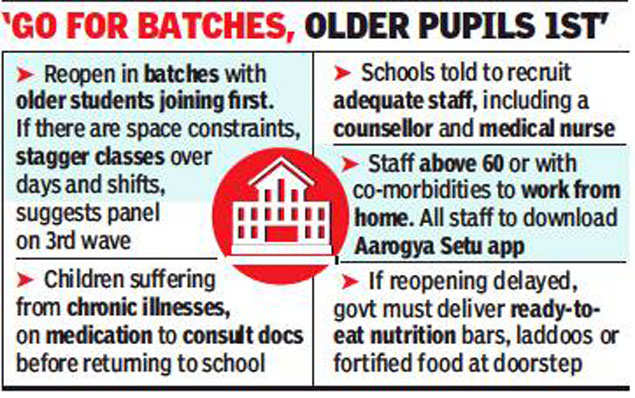BENGALURU: An expert committee set up to suggest measures to tackle the anticipated third Covid wave, headed by cardiac surgeon Dr Devi Shetty, has strongly recommended reopening of schools along with health insurance of Rs 2 lakh for each child attending the offline classes.
The ‘High Level Expert Committee for Prevention and Management of Covid Wave-3’ submitted its interim report to the state government on Saturday. It covers special requirements and various aspects of healthcare delivery.

“We have recommended a health cover of Rs 2 lakh to every child going to school to be sponsored by the state. This is not life insurance cover. The same has been tried in some countries. This way, we can build confidence among parents to send their wards to schools,” a panel member said.
The possibility of schools becoming infection hubs has not been proved anywhere in the world, the report says. “There is an urgent need to offer scientific and definitive guidance for school reopening as any delay in achieving near normalisation of schooling will be more detrimental than Covid-19 itself,” it says.
Digital learning achieved less than expected: Report
The panel has recommended that all government, aided and unaided schools — in rural areas, smaller towns and bigger towns — be reopened.
According to the committee’s projections, moderate by its own admission, 3.4 lakh of Karnataka’s 2.3 crore children in the 0-18 age group (just about 1.5%) may get infected during the third wave. Among those infected, 23,804 children might require hospitalisation, 6,801 ICU and 43,358 would require Covid care centres while the rest (over 2.6 lakh) can be looked after at home, the report says. It estimates that 85% of the infected children will be asymptomatic.
Doctors who worked on the report said schools can be reopened with adequate precautions once the case positivity rate in most districts during the second wave falls below 5% for two weeks.
Digital learning has achieved less than expected and also created large gaps in learning and educational inequality, the report says, arguing for optimising learning, physical health, mental health, and nutritional aspects of children. “Any further delay in school reopening may push children into malnutrition, child labour, child marriage, child trafficking, and begging, worsening their condition,” the report says.
“Awareness drives on physical distancing, mask, sanitisation and good ventilation of the premises should be ongoing and effective in all schools. The day-to-day troubleshooting needs to happen locally, taking clues from broader state guidelines,” the report added.





































